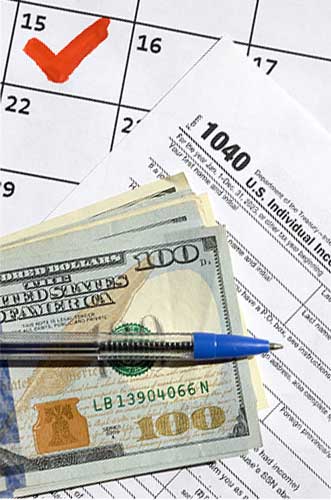
If you get sick or hurt and can’t work, you may be wondering: is disability insurance taxable? The answer will depend on which kind of disability insurance you have: Social Security Disability Insurance (SSDI), Supplemental Security Income (SSI), or private disability income insurance (DI).
We’ll go over all three below and explain their tax status.
Social Security Disability Insurance (SSDI) – Is it Taxable?
Supplemental Security Income (SSI) – Is it Taxable?
Private Disability Income Insurance – Is it Taxable?
The Advantages of Having Your Own Disability Insurance
➡️ Protect your financial future with disability insurance! Click the button below to request a free quote:
Request a Free QuoteSocial Security Disability Insurance (SSDI) – Is it Taxable?
Social Security Disability Insurance (SSDI) is a government program funded by payroll deductions. If you’ve worked enough hours to qualify for the program and experience a qualifying disability, the government will pay you a percentage of your income. The program is intended to help people who experience a disability that will keep them from working for at least a year. But since you contributed to this program with your tax dollars, it’s natural to wonder: are the program’s benefits taxable?
And the answer is: maybe. It depends on your total amount of income and your filing status. According to NOLO, only about one-third of people receiving SSDI end up owing tax on their benefits.*

Your benefits may be taxable when 50% of those benefits PLUS all other income exceeds the IRS’s income threshold for your tax filing status:**
- Filing single: $25,000
- Married filing jointly: $32,000
- Married filing separately: $0
If your income (including 50% of your disability benefits) crosses the threshold listed above, some of it will be taxable, as follows:**
- Filing single, income between $25,000 and $34,000: up to 50% of your disability benefits are taxable
- Filing single, income over $34,000: up to 85% of your disability benefits are taxable
- Married filing jointly, income between $32,000 and $44,000: up to 50% of your disability benefits are taxable
- Married filing jointly, income over $44,000: up to 85% of your disability benefits are taxable
The good news? If you’re disabled, chances are you don’t have much other income. So there’s a good chance your total income won’t cross these threshold amounts and, as a result, will not be taxable.

Because tax law changes every year, you should always ask your tax professional for the most up-to-date assessment of your tax situation. For more information about how SSDI is different from private disability insurance, click here.
➡️ If you’re worried about the effect a disability might have on your future earning potential, buying your own disability insurance makes a lot of sense! Click the button below to request a free quote:
Request a Free QuoteSupplemental Security Income (SSI) – Is it Taxable?
Supplemental Security Income (SSI) is also a government program that provides extra income for people with disabilities, the blind, and elderly people on a very low income.
The good news here? According to the IRS, SSI benefits are not taxed.^
You do not owe income tax on any payments you receive through the SSI program.
Private Disability Income Insurance – Is it Taxable?

Private disability income insurance is coverage you buy yourself. It’s not the same thing as the government programs described above. Like life insurance, you buy a DI policy from an insurer and make payments to keep your policy active. If you experience a qualifying disability, you submit a claim and, as long as your doctor signs off, you’ll get paid.
Like the government programs, private insurance can replace a percentage of your income. There isn’t any program or policy that will replace 100% of your income. But with private coverage, you can often pick details like your waiting period, how long you’ll receive benefits, and in some cases, what percent of your income you want paid (40% – 70%, usually). Each option affects the price of your coverage, so there’s a lot of wiggle room in terms of creating a policy that meets your needs and fits your budget.
And maybe the best news of all is this: private disability insurance is not taxable.
Disability income insurance is a product you pay for with after-tax dollars. And if you ever make a claim and receive a payout, that money is not taxable. That’s because the insurance company is fulfilling a contract by paying you – it’s not considered income, even though it’s replacing your income.
The exception? If you have coverage through work that your employer pays for, those benefits must be reported as income and could be taxable. If you share the cost with your employer, only a portion of your benefits must be reported as income.^^
➡️ Want to see how affordable a private disability insurance policy could be? Click the button below to request a free quote!
Request a Free QuoteThe Advantages of Having Your Own Disability Insurance

There are a lot of good reasons to buy your own disability coverage, rather than relying on the government’s benefits.
- Larger payout. Government benefits aren’t intended to replace your entire paycheck. In fact, the average monthly SSDI payout in 2023 was $1,483.*** That’s not going to go very far for anyone, let alone someone trying to support a family. On the other hand, private policies can pay out 40%-60% of your income (closer to the amount you get in your paycheck after tax).
- No work credits required. Government SSDI coverage requires you to have worked a certain amount in qualifying jobs where you paid into the system (FICA). Private coverage doesn’t have this requirement since it’s not funded by payroll taxes.
- Shorter waiting periods. For government benefits, the waiting period is at least five months. That’s a long time to support yourself and your family if you can’t work! Private coverage has waiting periods as little as 30, 60, and 90 days – you can price out each option to see which works best for your budget.
- Less chance of rejected claims. Most claims for government disability benefits get rejected. The Social Security Administration provides the figure of 67% - ouch.^^^ When you’re sick or hurt, do you really want to have to resubmit your claim and deal with government red-tape? Or would you rather your private insurance just paid you, so you can get on with your recovery?
- No retraining or job change requirements. To keep receiving SSDI benefits, you have to prove you can’t retrain for a new job either in your current field or work or a new field of work. But let’s face it – you’re already dealing with a disability. Job retraining may be too stressful or may even adversely affect your health and recovery. Private insurers offer benefits that will cover you whether you’re unable to work in your own occupation, or in any occupation.
- Tax-free benefits. As we covered above, the benefits from your private disability insurance are 100% income-tax-free, as long as you paid for the policy yourself with after-tax dollars. You never even have to report these benefits to the IRS.
➡️ Want to see how affordable a private disability insurance policy could be? Click the button below to request a free quote!
Request a Free QuoteFor informational purposes only. Always consult your tax professional for the most up-to-date assessment of your tax situation.
*”Are Social Security Disability Benefits Taxed?”, Nolo.com, accessed 5/30/23
**"Is Social Security Disability Taxable?", TurboTax.intuit.com, accessed 5/30/23
^"Regular & Disability Benefits," IRS.gov, accessed 5/30/23
^^"Life Insurance & Disability Insurance Proceeds 1," IRS.gov, accessed 5/30/23
***"How Much in Social Security Disability Benefits Can You Get?", Nolo.com, accessed 5/30/23
^^^"Outcomes of Applications for Disabiility Benefits," SSA.gov, accessed 5/30/23
